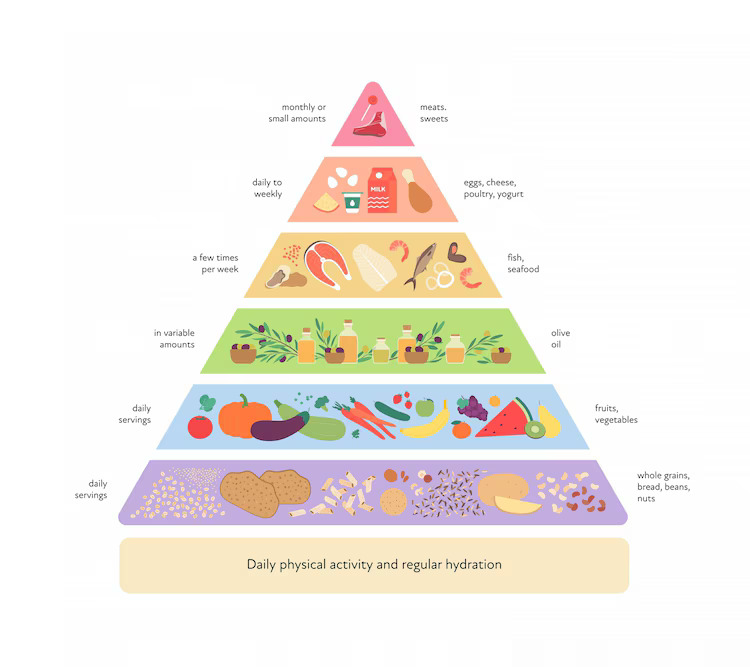Would you believe if I say that just by switching to a specific diet the risks of heart attacks, strokes, and cardiovascular death is reduced by 30%. The Mediterranean Diet is inspired by the traditional eating patterns of people living in Mediterranean regions like Greece, Italy, and Spain. A 2021 survey in the U.S. showed that about 20% of adults incorporate elements of the Mediterranean diet into their meals. In countries outside the Mediterranean region, millions are adopting it as a healthy eating pattern, especially among health-conscious communities. It emphasizes:
- Vegetables and Fruits: Fresh, colorful, and rich in vitamins and antioxidants.
- Whole Grains: Brown rice, quinoa, and whole-grain bread for sustained energy.
- Healthy Fats: Extra virgin olive oil and nuts, which protect your heart.
- Fish and Seafood: At least twice a week for brain and heart health.
- Low Sugar and Processed Foods: Less junk, more natural goodness.
- Herbs and Spices: Flavorful alternatives to excess salt.
- Community and Balance: Enjoy meals with loved ones, stay active, and embrace a balanced lifestyle.
Let us understand how the researchers found the benefits of this diet. The PREDIMED study confirms that the Mediterranean diet is more than just tasty—it’s a scientifically proven way to improve heart health, extend lifespan, and enhance overall well-being. It’s not just a diet; it’s a lifestyle that offers long-term benefits. The study included 7,447 participants, aged 55–80 years. All participants had risk factors for heart disease, such as diabetes, high blood pressure, obesity, smoking, or a family history of cardiovascular issues. None of them had a history of cardiovascular disease at the time of enrollment.
The participants were divided into 3 groups:
- One group ate the Mediterranean diet with extra virgin olive oil. They were given 1 liter of olive oil per week and encouraged to use it generously in cooking and meals.
- Another group ate the Mediterranean diet with extra nuts. They were provided 30 grams of mixed nuts daily (walnuts, hazelnuts, and almonds).
- The last group was told to follow a regular low-fat diet. They were advised to reduce their intake of fats, aiming for a diet traditionally seen as “heart-healthy.”
Researchers regularly checked participants’ diet adherence, weight, cholesterol levels, blood pressure, and overall health. They were checked for 5 years to see who stayed healthier. The results were surprising! The groups eating the Mediterranean diet had 30% fewer heart problems (like heart attacks and strokes). The diet improved cholesterol levels, reduced blood pressure, and helped with weight management without requiring calorie restrictions or intense exercise. They stayed healthier even though they didn’t eat fewer calories or exercise more than the low-fat group.
Healthy Fats from olive oil and nuts reduce bad cholesterol and inflammation. Antioxidants in fruits, vegetables, and whole grains fight cell damage. Omega-3 Fatty Acids in fish promote brain and heart health. Reducing processed foods and sugar improves blood sugar control.
Impact of the PREDIMED Study
It changed how doctors and dietitians approach heart disease prevention, shifting the focus to quality fats rather than low-fat diets. The findings support the idea that enjoying flavorful, balanced meals can be as effective as traditional “restrictive” diets in promoting health. So how should one follow the Mediterranean diet. There is a visual guide which will help us to follow this diet.
The Mediterranean Diet Pyramid
The Mediterranean Diet Pyramid is a visual guide that illustrates the types and proportions of foods recommended in the Mediterranean diet. It emphasizes eating patterns based on traditional Mediterranean lifestyles, focusing on balance, variety, and moderation.

Structure of the Mediterranean Diet Pyramid
1. Base of the Pyramid: Everyday Physical Activity & Social Interaction
- Encourages daily physical activity such as walking, gardening, or dancing.
- Emphasizes the importance of shared meals with family and friends, fostering emotional well-being.
2. Daily Foods: Plant-Based Foundation
- Vegetables: At least 5–8 servings a day (raw, cooked, or in salads).
- Fruits: 3–4 servings daily, as snacks or desserts.
- Whole Grains: Includes brown rice, quinoa, oats, whole-grain bread, and pasta.
- Legumes and Nuts: Beans, lentils, chickpeas, walnuts, almonds, and seeds.
- Healthy Fats: Use extra virgin olive oil as the primary fat for cooking and dressing.
- Herbs and Spices: Add natural flavor without extra salt.
3. Moderate Weekly Portions: Protein and Dairy
- Fish and Seafood: 2–3 servings per week, rich in omega-3 fatty acids.
- Poultry, Eggs, and Dairy:
- Poultry: 1–2 servings weekly.
- Eggs: 2–4 servings weekly.
- Dairy: Prefer low-fat or fermented options like yogurt and cheese.
4. Occasional Foods: Red Meat and Sweets
- Red Meat: Limited to a few times a month.
- Sweets: Should be enjoyed in moderation, occasionally rather than daily.
5. Top of the Pyramid: Wine (Optional)
- If alcohol is consumed, it is recommended in moderation:
- 1 glass per day for women, 2 for men.
- Always as part of a meal and not for non-drinkers.
(Although drinking alcohol is described as a part of the Mediterranean Diet Pyramid no amount of alcohol is considered safe for consumption as per medical research)
Key Principles
- Seasonality: Focus on fresh, seasonal, and local produce.
- Hydration: Drink plenty of water daily (tea and coffee in moderation, no sugary drinks).
- Cultural and Lifestyle Integration: It’s not just about food; it’s about adopting a healthy and joyful way of living.
The Mediterranean Diet Pyramid serves as a holistic approach to health, combining nutritious eating with physical activity and emotional well-being for a sustainable, fulfilling lifestyle.
2 thoughts on “Mediterranean Diet: Unlock the Secrets to Vibrant Health and Longevity”